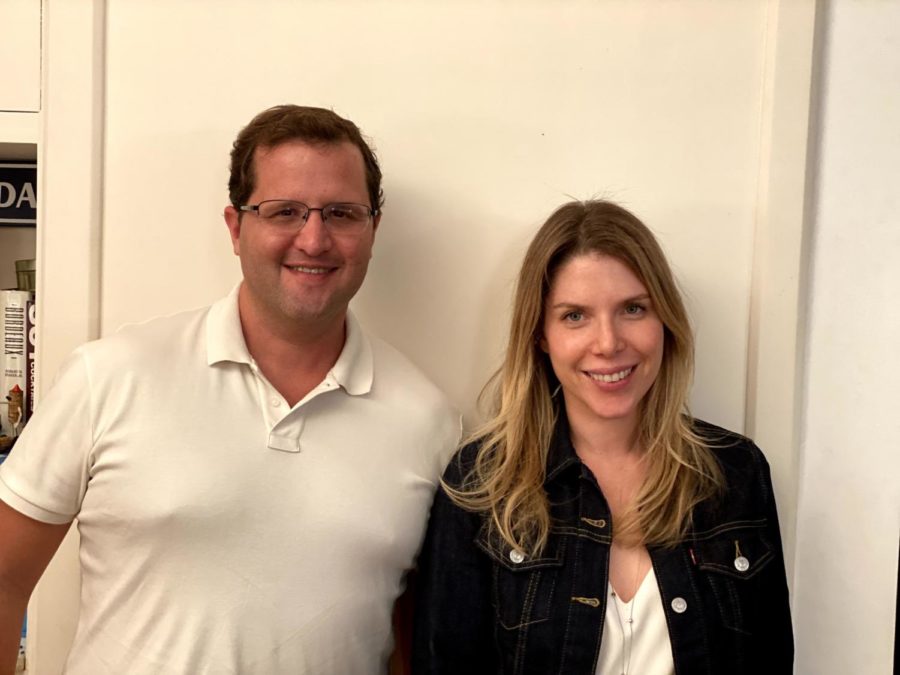A Tale of Graded Grandparents
When I met Mauro Ferman, a Graded Class of 1999 alumni, he spoke of how his friendships at the school still last to this day. One of these friendships, in fact, went further back than either of them could have ever imagined, and as Mauro told me the story in more detail, the combination of dedication, perseverance, and maybe just a little bit of coincidence was remarkable. Without a doubt, it is incredible cases such as this one that represent everything Graded stands for, both as a community and an institution.
Mauro Ferman and Marcella Kanner both attended Graded in the 90s, and the two first met when they were in 6th grade. Although they went on to become good friends over their years at school, there was one key connection between them that neither realized at first. Despite having met at Graded, their relationship in fact went back more than 50 years, to when Marcella’s grandfather, Navaldo Rocha, worked with Mauro’s family.
Having immigrated from Ukraine to Rio Grande do Norte in 1927, Moises Ferman, the grandfather of Mauro Ferman, had gone on to become one of the largest jewlers in the Northeast of Brazil. Originally selling simple pieces on the street as a young teen, he was able to open a store before the start of World War II. Fortune then struck when in 1942, the small city of Natal, where Ferman lived, was chosen as the area for an American military base. More than 10,000 American soldiers, almost 20% of the state capital’s population, were relocated to the base, and all of a sudden Ferman found himself with a plethora of customers. Soldiers stationed in Natal earned money in dollars, and as WWII proved to be relatively uneventful in the state capital, American troops turned to jewelry shopping to pass their time. Ferman’s sales began to explode. He began selling higher quality products, and at the height of the base’s occupation, the salesman would even travel on cargo planes to the U.S., stuffing his bags with expensive gems and watches he would later resell to American army men.
At around the same time as Ferman began to become a household name throughout Natal, a 12 year old with a one way ticket from the rural town of Caraúbas, Rio Grande do Norte, stepped foot in the state capital for the first time. Nevaldo Rocha had never been away from his small rural hometown or his parents, but now, they had spent their savings to put their son on a bus to the Natal in search of a better life. Lost, hungry, and without a place to sleep, Nevaldo had only one instruction in mind. His mom had told him to talk to the mayor, who would hopefully find him a job where he could get food and a place to live. Fortunately, Ferman, now known around the city for his popular jewelry store, was looking for an employee, and he agreed to take the little boy in and provide him with a bed to sleep in.
Over the next few months Rocha began to perform tasks for Ferman, and as he gained experience in the jewelry business, the owner decided to hire him full time. At the age of just 14, he was in charge of looking after the store when Ferman left to take care of business in other cities.
Business was going well, but in the late 1950s, as the demand for jewelry began to stall, Ferman decided to pack up his belongings and move with his wife and young daughter to open more businesses around Brazil. The jewelry store would have to be closed, but instead of letting the establishment he’d built from the ground up go to waste, Ferman had a better idea. He would leave the business to his right hand man, Rocha.
Over the next few years, Nevaldo Rocha would transform the business he had inherited. As soldiers left Natal following the end of the war, the jewelry shop began selling other items, such as clothing and tapestry. Despite having dropped out of school following fourth grade, Rocha began to learn about fashion, eventually transforming the store into a primarily textile-focused line. The company grew, and the entrepreneur would begin to open factories and branches all over the Northeast of Brazil, founding the company that would eventually become Grupo Guararapes, the owner of the Riachuelo Fashion brand. Today, Riachuelo is ranked as the most valuable fashion brand in all of Brazil, and although Rocha passed away in 2020, his legacy, starting from a simple town in Rio Grande do Norte, lives on through the millions of clothing items sold every year by the company he created.
Hearing this story, I was intrigued by the success that Ferman and Rocha had been able to achieve, especially starting from such a disadvantaged position – the former as an immigrant, and the latter as a boy taking a chance at life in a city. We often hear in the media about American and European cases of success, yet right here in Brazil, two young men from completely different backgrounds were able to carve out a thriving business in jewelry despite their humble beginings. Then, two generations later, their grandchildren would meet again, this time at one of the most prestigious schools in all of the country.
This firsthand narrative exemplifies the difficulties many Brazilians face to this day when it comes to relocating from a town or region where it is nearly impossible to forge a life of monetary wealth. Often, it is easy to wonder why people living in cities such as Caraúbas don’t immediately relocate, but stories such as Nevaldo’s truly highlight the struggle that comes with moving. From a story like this, it is easy to see why better infrastructure and organization on the part of the government is crucial if Brazil aims to continue developing as a country. We often hear about the need for more investment in sectors such as education or health, but what is often overlooked is the need to establish a well-connected country, where citizens are equal regardless of economic status or geographical location. Throughout Brazil, only 13% of roads today have any kind of paving whatsoever, and the lack of easy access to larger cities from more rural areas is an issue that continues to plague residents growing up on farms and small towns across the country. It must be the government’s duty to prioritize the development of basic requirements such as paved roads, as with this development, more citizens like Nevaldo would be granted better access to regions with more opportunities.
This story also reflects on Graded as an institution. Looking at the school’s core values, there is no better example than this of true perseverance and success. Throughout my time in the community (more than 10 years), Graded’s mission has always been to inspire, and undoubtedly, some of the most inspirational accounts come from families themselves.
However, this narrative is only a fraction of the full Graded tale. Moises Ferman and Marcos Rocha worked hard for their families to get to where they are today. A fourth grade dropout himself, Rocha’s grandchildren attended one of the most distinguished schools in all of Brazil, and will now have the opportunity to make their own impact on the world. It is possible to observe how when we are in a position of privilege, such as attending a school like Graded, it becomes possible to take advantage of this privilege in a way other people with lesser opportunities aren’t able to. The same way Rocha and Fermann were able to set up their families in a position to succeed, every family at Graded has worked hard to reach this point, and now it is the students turn to make the most of their opportunity, just like Marcella and Mauro have as class of 1996 alumni.
More than anything however, I believe this story shows us how important support is for even the most ambitious to achieve their goals. If more people in Brazil were to get the support Nevaldo Rocha got, countless dreams would be able to become reality. Sometimes, all it takes to kickstart a journey is something as simple as getting a bus ticket to a larger city. At Graded, we have all the support in the world to pursue what we love, and Mauro Ferman, who I heard the story from originally, summed up perfectly why it is so important to make the most out of the opportunities we have within our very campus: if you do so, then one day your own grandchildren can achieve their own dreams, and pursue their own legacy just like their family before them.

Going into his senior year, Leo is looking forward to joining the Talon POV team. Having been at Graded since second grade, he is excited to share his...










